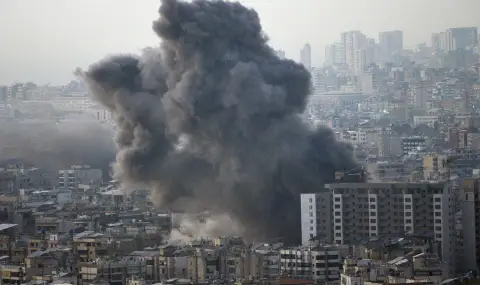It is 2 in the middle of the night when the phone at home starts to ring. The voice of a complete stranger is heard across the street saying that the entire family must leave the area immediately as it will be bombed. Will you give up everything - your home, your belongings, your pets? Can you just leave in your pajamas, not knowing if you'll ever come back? Thousands of people find themselves in such a situation in Lebanon today, Aya Majoub, who is deputy regional director of “Amnesty International”, tells DV. for the Middle East and North Africa.
A quarter of Lebanon is under Israeli military command
According to the Office of the United Nations High Commissioner for Human Rights, about a quarter of the territory of Lebanon “is now under the command of the Israeli military”. It will say that - while fighting the terrorist group Hezbollah - they can require the local population to leave the area if they do not want to put themselves in danger.
„And most people don't even get phone calls,”, assures Majoub. Often the warning is simply uploaded to social networks in Arabic, she adds. The case of a few days ago is exactly like this: “Between 1 and 4 in the morning, evacuation warnings were published on the X platform (before Twitter),”, says Majoub. They referred to certain parts of Beirut. "Most people would have missed them if it weren't for the young people from the neighborhood who went outside and started shooting in the air to wake people up," the human rights activist says.
This is just one of the incidents that have prompted groups such as “Amnesty International” and “Human Rights Watch“ to criticize Israel's way of warning citizens of an impending attack in Lebanon. Warnings are issued very late – just minutes before an impending attack. In addition, in many cases they are too general, and inaccurate or misleading maps are often used.
Can an entire city be evacuated in four hours
Israel recently issued its first citywide warning: on the morning of October 30, an Israeli military spokesman wrote in X, addressing local residents in the eastern city of Baalbek, that Israel intended to “use military force against Hezbollah in your city”.
Israeli airstrikes began just four hours later – a time not at all sufficient to evacuate an entire city of between 80,000 and 100,000 people. Subsequently, the “Washington Post“ published a report from which it became clear that most of the strikes on the day in question were outside the evacuation zone.
A few days earlier, the Hezbollah group also issued a series of evacuation warnings aimed at residents of more than 20 cities in northern Israel. The group has missiles, but no combat aircraft. Therefore, many observers described these warnings primarily as “psychological warfare”.
However, “Amnesty International” there are the same remarks about Hezbollah, whose evacuation warnings are overly general and imprecise – they refer to entire settlements and do not target specific military targets, notes Majoub.
What does international law say?
The duty of the military to warn the civilian population before an attack dates back to 1863. - from the time of the American Civil War. It was then that the first attempt was made to define rules of conduct on the battlefield, and many of these principles fit perfectly into today's international humanitarian law.
Recently, the duty to warn has been viewed as a “common law” - because it is accepted by most armies. The International Committee of the Red Cross notes that many modern military codes of conduct, including Israel's, contain this obligation.
But are these warnings effective, ie. do they allow civilians to move away from danger? “Putting out a warning on social media in the middle of the night is not effective – I think we can all agree on that," said Aya Majoub of Amnesty International, referring to the specific case described in Beirut.
Civilians are protected - even if they don't evacuate
After an evacuation warning, other rules continue to apply, says Emmanuela-Chiara Gillard of the Oxford Institute for Ethics, Law and Armed Conflict. For example, if civilians did not follow the call to evacuate but remained in the area for which the warning was issued, they cannot automatically be considered combatants. Once civilians have moved away from danger, they should be allowed to return when it is safe again. Otherwise, it can be seen as forced displacement, which is considered a war crime.
Evacuation warnings could lead to forced displacement if they were given with the intention of not allowing people to return, Majoub said. In Lebanon, it is now difficult to say which of the two cases is involved, as the conflict is still in its infancy.
Author: Catherine Scheer
